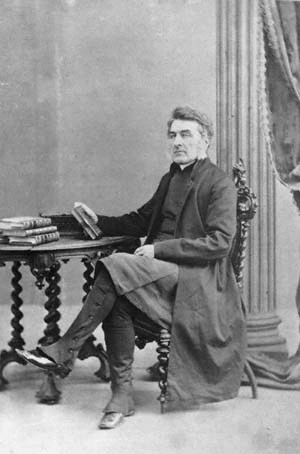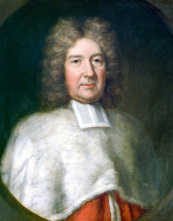
The Church of Ireland is a Christian church in Ireland, and an autonomous province of the Anglican Communion. It is organised on an all-Ireland basis and is the second-largest Christian church on the island after the Roman Catholic Church. Like other Anglican churches, it has retained elements of pre-Reformation practice, notably its episcopal polity, while rejecting the primacy of the pope.

The Church of St Margaret, Westminster Abbey is in the grounds of Westminster Abbey on Parliament Square, London, England. It is dedicated to Margaret of Antioch, and forms part of a single World Heritage Site with the Palace of Westminster and Westminster Abbey.
A royal peculiar is a Church of England parish or church exempt from the jurisdiction of the diocese and the province in which it lies, and subject to the direct jurisdiction of the monarch.

Oliver Plunkett was the Catholic Archbishop of Armagh and Primate of All Ireland and the last victim of the Popish Plot. He was beatified in 1920 and canonised in 1975, thus becoming the first new Irish saint in almost seven hundred years.
David Staffurth Stancliffe is a retired Church of England bishop. He was Provost of Portsmouth Cathedral from 1982 to 1993, and the Bishop of Salisbury from 1993 to 2010. He is the third generation of his family to serve the ordained ministry.

Lord John George de la Poer Beresford was an Anglican archbishop and Primate.

The Diocese of Dromore is a Latin Church diocese of the Catholic Church in Northern Ireland. It is one of eight suffragan dioceses which are subject to the Metropolitan Archdiocese of Armagh.

Hilary was a medieval bishop of Chichester in England. English by birth, he studied canon law and worked in Rome as a papal clerk. During his time there, he became acquainted with a number of ecclesiastics, including the future Pope Adrian IV, and the writer John of Salisbury. In England, he served as a clerk for Henry of Blois, who was the bishop of Winchester and brother of King Stephen of England. After Hilary's unsuccessful nomination to become Archbishop of York, Pope Eugene III compensated him by promoting him to the bishopric of Chichester in 1147.

Francis Fulford was an Anglican Bishop of Montreal.
Ian Gregory Bishop is a British Anglican bishop. Since September 2023, he has been Bishop of Thetford, a suffragan bishop in the Church of England's Diocese of Norwich. He was Archdeacon of Macclesfield in the Diocese of Chester from 2011 to 2023.
John Roan,D.D. was a Church of Ireland Bishop of Killaloe.
Brabazon William Disney was an Irish Dean in the middle of the 19th century.
Luke Netterville was an Anglo-Norman churchman in Ireland, archbishop of Armagh from 1218.

'Michael Ward (1643-1681) was an English 17th-century Anglican bishop and academic who served as the 12th Provost of Trinity College Dublin from 1675 to 1678.
Ralph Lambert (1667–1731) was an Irish Anglican priest in the first half of the 18th century.
John James Frey was born Johann Jacob Frey in Basel on 6 June 1606 as the son of a notable Basel family. He studied at the University of Basel, where he graduated MA in 1625. He then went to study in Geneva, Lyons and Oxford. From January 1629 he was tutor to Richard Boyle, 1st Earl of Burlington, the oldest son of Richard Boyle, 1st Earl of Cork, possibly recommended by Sir Henry Wotton. Frey was incorporated MA of Oxford as a member of Christ Church on 4 July 1629, and ordained as Anglican Deacon at Westminster in May 1630. He was in Basel as pastor at St. Margrethen for a few months and briefly matriculated for theology in Leyden. In 1632-1633, Frey toured France with young Richard Boyle, then stayed in London and Lismore, doing research for Archbishop James Ussher.
In the summer of 1635, after Dungarvan’s marriage, Frey returned to Switzerland, bringing back a library of about 130 English volumes which are held at the University of Basel. They include sermons and theology, but also poetry, plays, Walter Raleigh's History of the world, and a Second Folio of Shakespeare’s works. The books formed one of the foundations for the Frey-Grynaeum library in Basel, a building and collection established by the theology professor Johann Ludwig Frey, a great-grandson (1682-1759). About 30 volumes carry Frey's signature and some notes. These volumes include a Bible in Hebrew and Greek but also some quite surprising items for a Protestant minister: Francis Bacon's Advancement of Learning, Marcus Aurelius' Meditations in a critical English edition, the early Latin epigrams of Richard Crashaw, John Selden's Marmora Arundelliana and Plato’s Menexenos with several pages of notes.
Frey had returned to Basel to take up a position as Professor of Greek at the University of Basel, where he was much respected but felt “bound to Basel against my will”. He was longing to return to Britain but turned down a pressing offer to tutor the young semi-orphaned sons of George Villiers, 1st Duke of Buckingham. Instead, he agreed to become dean of Armagh in Ireland. on 15 November 1635, planning to move to Ireland in the spring of 1637. On 28 August 16163, the day that the Basel authorities decided to grant him leave to take up his post in Ireland, Frey died of a "fever" on 28 August 1636, just 30 years old.
Frey was intensely mourned by Swiss and English friends as a brilliantly gifted and lovable man. In 1653, James Ussher fondly remembered the intellectual exchanges he enjoyed when “our Frey” was among the living. Frey’s correspondence shows that his linguistic skills included - beyond the usual theologian’s tools of Latin, Greek, Hebrew, Syriac and possibly Arabic – fluent and idiomatic French, Italian and English. Ordained at age 23, he must have spoken English well enough to preach even then, and he corresponded in English with scholars such as Ussher and John Gregory as well as with aristocratic lords and ladies such as Frances Clifford and her daughter Elizabeth Boyle.
John Freind Robinson, 1st Baronet was Archdeacon of Armagh from 1786 until his resignation in 1797.
Joseph Story was an 18th-century Anglican priest in Ireland.
Henry Clarke (1700–1777) was an Irish academic.








